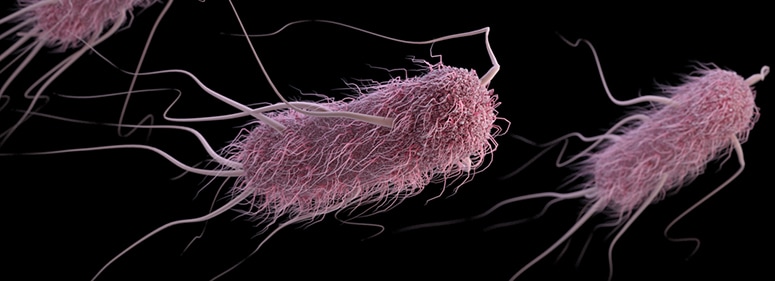A bacterial outbreak at UCLA Medical Center alerted health professionals to a new safety concern. The infection, an antibiotic-resistant strain of CRE, killed three people and injured many others before the investigators discovered the culprit.
The team of professionals tracked the superbug to a dirty duodenoscope, a lightweight tube that’s threaded through the intestines to perform endoscopic retrograde cholangiopancreatography (ERCP).
Because of ineffective cleaning mechanisms, a number of bacterial infections can creep into medical scopes and cause doctors to unknowingly spread the bugs. It’s important to be aware of the different bacterial strains that stick to dirty scopes.
Common Bacterial Infections

E. coli, a common foodborne illness, can be spread through the continued use of a contaminated duodenoscope.
Image: CDC
- E-coli (Escherichia coli)
- Klebsiella pneumoniae
- CRE (Carbapenem-resistant enterobacteria)
- Pseudomonas aeruginosa
Secondary Bacterial Infections

Sepsis is a life-threatening complication that can lead to organ failure and death.
Image: Rory Stanton Foundation
- ESBL (Extended-spectrum beta-lactamase)
- Enterococcus
- Stenotrophomonas maltophilia
- Enterobacter cloacae complex
- Citrobacter freundii
- ESBL positive
- Staphylococcus epidermis
- Sepsis/septicemia
- Delayed bacteremia post-ERCP
Duodenoscopes are used in an estimated 50,000 ERCP procedures each year. Difficulties disinfecting the scopes make it possible to unknowingly spread any of the infections listed above.
Individuals who developed a bacterial infection have a legal right to seek compensation. Learn more about eligibility by requesting a free case review today.
CitizensReport
Latest posts by CitizensReport (see all)
- 4 Natural Alternatives To Energy Drinks That Will Make You Feel Healthier - February 19, 2018
- NBC Nightly News Publishes Expose On IVC Filters - February 18, 2018
- Good Sugar, Bad Sugar: Why You Should Eat More Fruit - February 16, 2018


Join the discussion